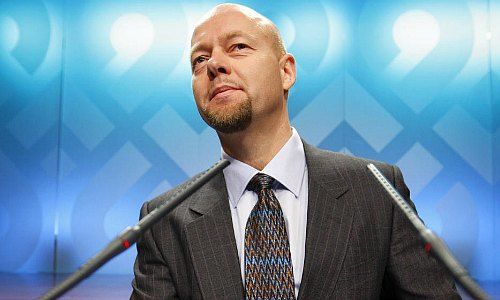A big shareholder in Credit Suisse is taking aim at exactly the sophisticated types of compensation plans for top executives and CEOs that the Swiss bank has excelled at in recent years.
«We are signaling that we expect change in the way remuneration is constructed.» The demand isn't from a Swiss pension fund or shareholder advocate – it is from Yngve Slynstad, head of Norges in the «Financial Times».
Oil-rich Norway's $910 billion fund is the world's largest investor: it owns an average 1.3 percent of every publicly-listed firm worldwide. In Switzerland, it is a notable investor in blue-chip stocks like Nestle, Novartis, Roche, and UBS.
One of the fund's most notable positions is a 4.93 percent stake in Credit Suisse, which ranks it among the Swiss bank's largest shareholders alongside Qatar's sovereign wealth fund, the Olayan Group or U.S.-based Harris Associates.
«Nobody is Comfortable»
Slyngstad said most people want pay schemes, which have steadily crept higher again following the financial crisis, to change. «In our opinion, neither society at large, nor regulators, investors, boards or even CEOs are comfortable with where we are at the moment.»
CEO pay is increasingly dominated by long-term incentive plans, but those plans are opaque, complex and difficult for shareholders to understand, he argues.
Slyngstad's comments underscore the fund's recent activism in opposing pay schemes at firms like UBS and Zurich Insurance. Last year, Norges voted against the compensation proposals of Alphabet, J.P. Morgan, Goldman Sachs and Sanofi.
«Simple, Transparent»
Now, the normally reserved sovereign wealth fund is proposing that pay plans be «long-term, simple and transparent.»
Norges doesn't want to set a specific cap for pay, but will encourage corporate boards to set CEO salary limits.
Slyngstad criticizes that the criteria governing long-term pay plans are often altered to benefit management.
«These metrics create a distraction for CEOs, the boards and also investors,» he said. In his view, a greater proportion of salaries should be paid out in stocks, with five- to ten-year lockups.
Millions Amid Losses
The Norges boss didn't mention any specific stocks in his comments, but Swiss bank bosses have been among the top earners globally in recent years: UBS CEO Sergio Ermotti earned roughly 14 million Swiss francs in total compensation for each of the last two years.
Tidjane Thiam is a relative newcomer to Switzerland, but his salary is equally plush: this year, he earned 11.9 million francs, including a 4.2 million francs long-term bonus.
The pay scheme was unveiled as Credit Suisse reportedly considers tapping shareholders for several billion francs to plug a hole in its capital cushion, and after it posted two consecutive full-year losses.
Firestorm of Criticism
The CEO's salary as well as those of Credit Suisse's top executives and chairman Urs Rohner have unleashed a firestorm of public criticism and opposition, such as from shareholder group Glass Lewis.
Credit Suisse has long championed long-term pay schemes: in 2010, the bank infuriated shareholders when it paid former CEO Brady Dougan 90 million Swiss francs from two different pay schemes. The activism of Norges, which doesn't normally air its views publicly, could be a harbinger of wider change on the hot-button issue.
A tumultuous shareholder meeting at British oil firm BP prompted a 40 percent pay cut for CEO Bob Dudley last year – though with $11.4 million, he was still one of the best-paid executives in Britain.



































